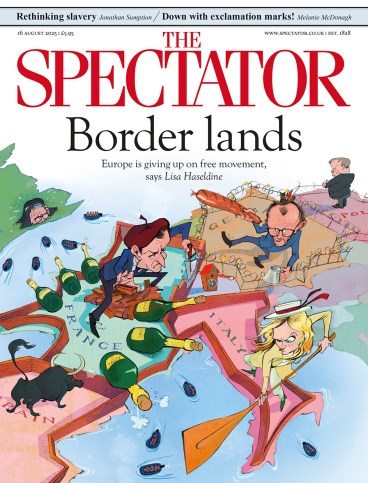
In this season of scant corporate news – a Ryanair rant against the French here, a new BP oilfield there – it’s hard to know what business leaders are thinking about the cold months to come. Until, that is, you read a survey conducted last month for the Institute of Directors. Given that I’m writing from France this month, I’d call it an absolute croissant-dropper.
The nub is that 639 UK businesses, large and small, report ‘optimism in prospects for the UK economy’ at -72, lower even than their darkest pandemic sentiment at -69 in April 2020. Export hopes and investment intentions are down, wage expectations are sharply up and, unsurprisingly, headcounts are set to fall.
No less than 85 per cent of respondents believe ‘government policy so far will be unsuccessful in driving up economic growth’. Significantly, this isn’t just traditional anti-Labour boardroom sentiment: the confidence index spiked in positive territory immediately after Sir Keir Starmer’s election victory. But it plunged after Rachel Reeves’s October Budget and is now at its lowest since the series began in 2016.
Many firms are ‘struggling to plan amid a cacophony of risk’, adds the Institute’s chief economist Anna Leach. ‘The government must urgently quash rumours of further tax rises for business this autumn, and accelerate planning reforms and deregulation.’
To which Downing Street spinners might respond, ‘Who listens to the diminished IoD these days?’ But then again, who else out there is trying to interpret the exigencies of hard-pressed business to Labour’s cabinet of incompetents and union toadies? Where are they now, the 121 ‘business leaders and investors’ (albeit many we’d never heard of) who signed a pre-election letter last May endorsing Labour’s plan for growth which so rapidly turned to dust? The bitter truth is that this is the least business-savvy government for the past 50 years. And if a cross-section of frontline corporate chiefs are as utterly disheartened as the IoD survey suggests, things can only get worse.
Airport scuffle
I hesitate to wade into an airport scuffle between two entities I admire, namely Ryanair and, in a very broad sense, the French Republic. But the airline claims that 36,000 of its flights between January and July suffered delays caused by mismanagement and strikes in French air traffic control. It also says that a hike in ‘solidarity tax’ on short-haul fares from €2.63 to €7.40 has rendered many French routes uneconomic, necessitating a 750,000-seat cull for the coming winter and further cuts in 2026 that will ‘leave French regional airports half empty’ – where it might otherwise have invested $2.5 billion for a doubling of passenger numbers.
Normally I’d cheerlead for Ryanair here, but its stand-off includes the total closure of services to two airports, Bergerac and Brive, I use often – and I won’t be taking private jets instead, since they now incur a tax of €420 per passenger. Perhaps Donald Trump’s special diplomatic envoy Steve Witkoff could usefully be re-routed to negotiate a peace settlement.
Shape-shifting BP
Even the most ardent climate-change activist – though perhaps not Ed Miliband – should admire the resilience of BP. The energy giant has announced a major oil and gas discovery in the Santos basin off Brazil following finds in Trinidad and north Africa and, in defiance of Miliband, the reopening of the mothballed Murlach field in the North Sea.
This is the company that suffered huge flak for its Texas City refinery fire in 2005 and Deepwater Horizon rig explosion in 2010, took write-offs of $24 billion on its exit from Russia in 2022 – and declared a pivot towards renewables which it has lately abandoned in favour of lots more oil and gas. Meanwhile its share price stands lower than 20 years ago, as does its reputation among peers, summed up by a rival director as ‘leaden-footed, high-cost and over-bureaucratic’. Just as the once world-scale Royal Bank of Scotland has shrunk to a string of north-of-the-border branches, so by rights BP ought to have survived as little more than a filling-station logo. But it’s still a global player – and that shape-shifting power of self-renewal is, for me, what makes the big corporate world such a fascinating field of study.
The hat man’s lament
The hat merchant of Monpazier is so lugubrious, despite selling my party several sunhats then inviting himself to join us for a beer, that I wonder whether he might be president of a French branch of the Institute of Directors. Consumer spending really is flatter than a flat cap this summer, he tells me, especially by the tribe of campeurs hollondais who are the paradigm of tight-fisted tourism in these parts. And as a purveyor of cheap baseball caps from India and pricier Panamas from Ecuador, he’s a tiny cog in a global trade machine that’s spluttering under the onslaught of Trump’s tariffs and the retreat of globalisation.
So his doom-laden tour d’horizon is not without cause. It rhymes with reports that unemployment for French 15- to 24-year-olds persists at around 19 per cent, within an overall rate of 7.5 per cent – compared with ours at 4.7 per cent, if you believe the way it’s measured – and that tens of thousands more jobs are at the mercy of Trump’s whim. Against that backdrop, did I perhaps over-egg the francophilia when I wrote last week about the animal spirits of my own revivified village of St Pompon?
Saturday’s marché gourmand nocturne offers a test. In early evening heat close to 40ºC, the crowd and the trade are thin. But as the sun sets, the trestle tables fill up, the food queues lengthen, even the Dutch campers spend freely – and at dusk the DJ plays a version of ‘Le Madison’ that brings out 30 spontaneous line dancers, including the village postmaster, in perfect formation. Rosé from Puy l’Évêque at €7 a bottle helps, but the upbeat energy I was looking for is here – and my eyes are filled with tears.









Comments